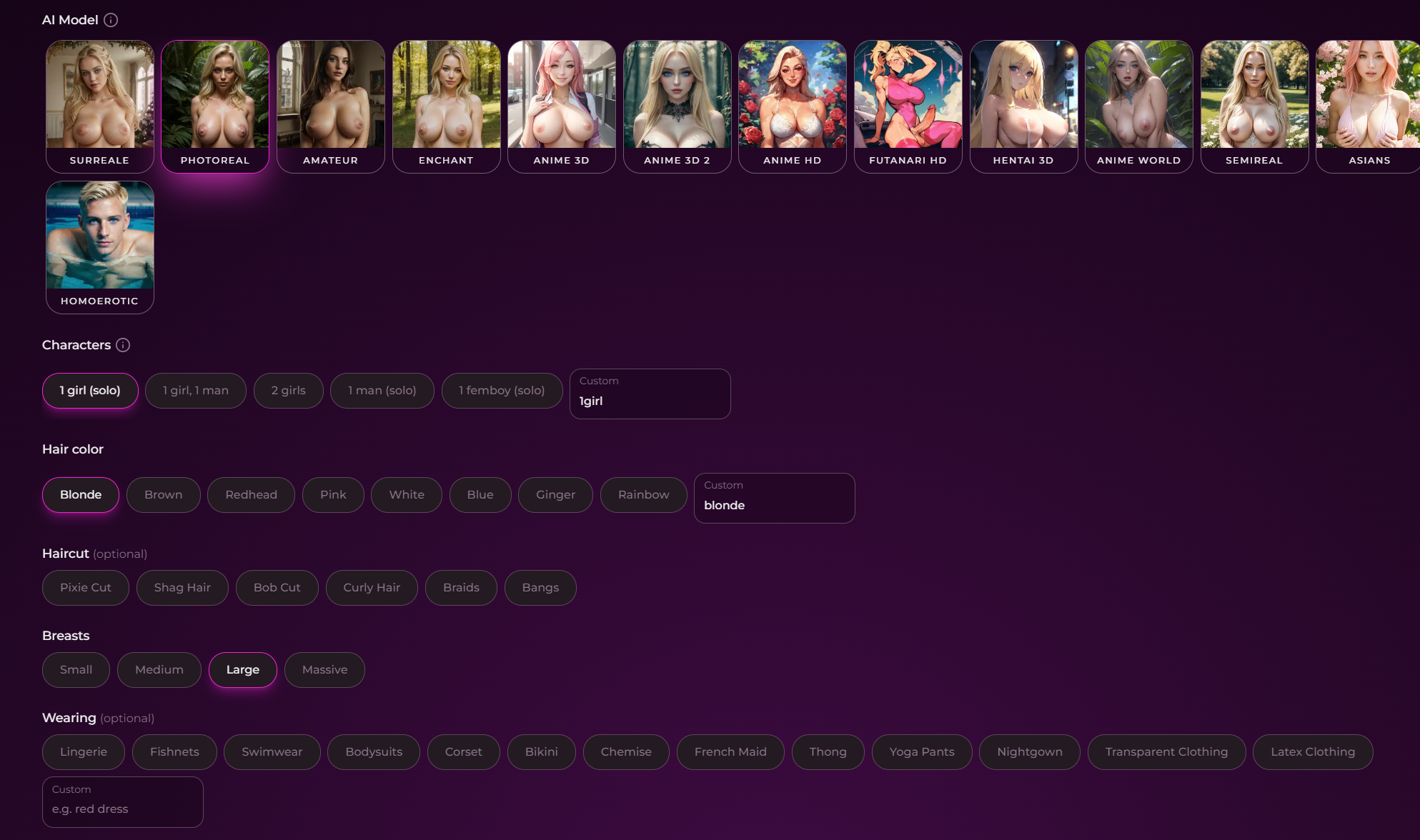Sometimes, it’s hard to believe the advancements teens have made in technology. From virtual reality to artificial intelligence, this generation is constantly pushing the boundaries and using these tools to revolutionize their own bodies. With the rise of AI-powered devices and applications, teenagers are now able to enhance and alter their physical appearance in ways that were once unimaginable.
The Emergence of Candy.ai
One of the most popular AI-powered apps among teenagers is Candy.ai. This app uses advanced facial recognition technology to analyze a user’s face and provide them with recommended cosmetic procedures to enhance their appearance. The app also has a feature that allows users to virtually try on different cosmetic procedures such as nose jobs, lip fillers, and Botox injections.
Pros:
- Allows users to visualize potential results before undergoing a procedure
- Provides personalized recommendations based on facial analysis
- Helps reduce the risk of dissatisfaction with cosmetic procedures
- Cost-effective alternative to traditional consultations with cosmetic surgeons
Cons:
- No regulation or oversight on the accuracy of recommendations
- Lacks medical expertise and could potentially lead to harmful results
- May lead to excessive or unnecessary use of cosmetic procedures
- Promotes unrealistic beauty standards by suggesting multiple procedures

Seduced.ai: The Fitness Revolution
In addition to enhancing their appearances, teenagers are also using AI for fitness purposes. Seduced.ai is an AI-powered workout app that creates personalized fitness plans for users based on their goals, preferences, and progress. The app uses machine learning algorithms to track a user’s performance and adjust their workout plan accordingly.
Pros:
- Adjusts plans based on progress and goals
- Provides real-time feedback and motivation during workouts
- Offers a cost-effective alternative to personal trainers
- Creates personalized fitness plans for users
Cons:
- Lacks the human element of personal trainers, which could lead to less effective workouts
- No regulation or oversight on the accuracy of the workout plans
- May not be suitable for individuals with certain health conditions or injuries
- Promotes a one-size-fits-all approach to fitness

The Controversy of PromptChan
PromptChan is an AI-powered chatbot that provides users with daily prompts for self-improvement and personal development. The prompts range from simple tasks such as making your bed every morning to more extreme challenges like going vegan for a week. While some see this as a fun and helpful way to improve oneself, others have raised concerns about its potential negative effects on mental health.
Pros:
- Serves as a source of inspiration and motivation for users looking to make positive changes in their lives
- Promotes self-improvement and personal growth through daily prompts
- Gamifies the process of self-improvement, making it more engaging for teenagers
- Can be used as a tool for building healthy habits and breaking bad ones
Cons:
- Some prompts may be unrealistic or unhealthy for certain individuals.
- The focus on external validation through completing challenges may not encourage genuine personal growth.
- The promotion of constant self-evaluation can be overwhelming and potentially harmful for individuals with existing mental health issues such as anxiety or body dysmorphia.
- No regulation or oversight on the accuracy or effectiveness of the prompts. Sometimes, finding love later in life can be challenging, but with the help of over70dating.com reviews, seniors can navigate the online dating scene and find companionship. Until now, the concept of an AI girl masturbating was nothing more than a fantasy.
The Implications of Teenager’s Use of AI on Their Bodies
While Candy.ai, Seduced.ai, and PromptChan may have their advantages, there are also potential implications to consider when it comes to teenagers utilizing AI to alter their bodies. These include:
Promotion of Unrealistic Beauty Standards
The use of AI to enhance one’s appearance can promote unrealistic beauty standards, especially for impressionable teenagers. By suggesting multiple cosmetic procedures and promoting a flawless ideal, these AI-powered apps can contribute to body dissatisfaction and low self-esteem.
Health Risks
There is also a concern that the lack of medical expertise behind these AI-powered apps could lead to harmful results. While they may seem like cost-effective alternatives to traditional procedures, the lack of regulation and oversight means that users are taking potentially dangerous risks with their health.
Impact on Mental Health
The constant focus on self-improvement through AI-powered apps can also have negative effects on mental health. The pressure to constantly evaluate and improve oneself can lead to increased stress, anxiety, and body image issues. It is important for teenagers to understand the limitations of these apps and prioritize their mental well-being over physical transformations.
Privacy Concerns
AI-powered apps collect large amounts of personal data from users in order to provide personalized recommendations and adjust plans accordingly. This raises concerns about privacy and the potential misuse of this data by companies or third parties.
Lack of Human Connection
Another implication is the potential decrease in genuine human connection, as the use of AI-powered apps replaces interactions with real-life personal trainers, doctors, or therapists. This could lead to a lack of empathy and understanding, as well as an over-reliance on technology for personal improvement.
To Recap
From virtual reality to artificial intelligence, teenagers are utilizing advanced technologies to revolutionize their bodies. While there are certainly benefits to these AI-powered apps such as personalized recommendations and cost-effectiveness, there are also significant implications to consider. It is important for teenagers to approach the use of AI for body modifications with caution and prioritize their mental and physical well-being above societal beauty standards. As technology continues to advance at a rapid pace, it is crucial for individuals and society as a whole to carefully consider the potential consequences of incorporating AI into our daily lives.

Candy.ai
✔️ Generate AI Porn Images
✔️ Listen To Voice Messages
✔️ Fast Response Time

Seduced.ai
✔️ Generate AI Models
✔️ Save & Reuse Girls
✔️ 300 Images Per Month

PromptChan.ai
✔️ Completely Free To Test
✔️ Edit Your AI Models
✔️ Make Porn Images (no limit)
What is the meaning of teen tits ai?
Teen tits ai refers to a type of artificial intelligence (AI) technology that is used in the development of computer-generated images or videos featuring young women with large breasts. This term is often associated with pornographic content and has been criticized for objectifying and sexualizing underage girls.
Can you provide more information on teen tits and AI?
Teen tits AI refers to the use of artificial intelligence in analyzing and categorizing images of teenage breasts. This technology has been developed to help identify underage individuals who may be sharing explicit content online. It is currently being used by law enforcement agencies to combat child exploitation and protect minors.
How does this topic relate to teenagers and artificial intelligence?
The topic of teen tits ai may refer to the intersection of teenage bodies and artificial intelligence technology. This could encompass discussions about the objectification of young girls in AI-generated content, or how technology is impacting body image and self-esteem among teenagers. It could also touch on the ethical implications of using AI to manipulate or enhance physical features during adolescence. This topic highlights the complex relationship between teenage identity and emerging technologies such as artificial intelligence.
